Noble metals that have been cleared of impurities have a high value, but little functionality due to their natural flaws. Native yellow metal is extremely soft. That is why different alloys are used in the production of jewelry to improve the natural properties of the precious metal.
What is a jewelry alloy and the reasons for the connection of different metals
Jewelry alloy - A mixture of noble metals and non-ferrous metals with the more practical natural properties of the material. It is most often used in the production of jewelry. As a base they use gold, silver, the amount of which can vary from 75% to 98%.
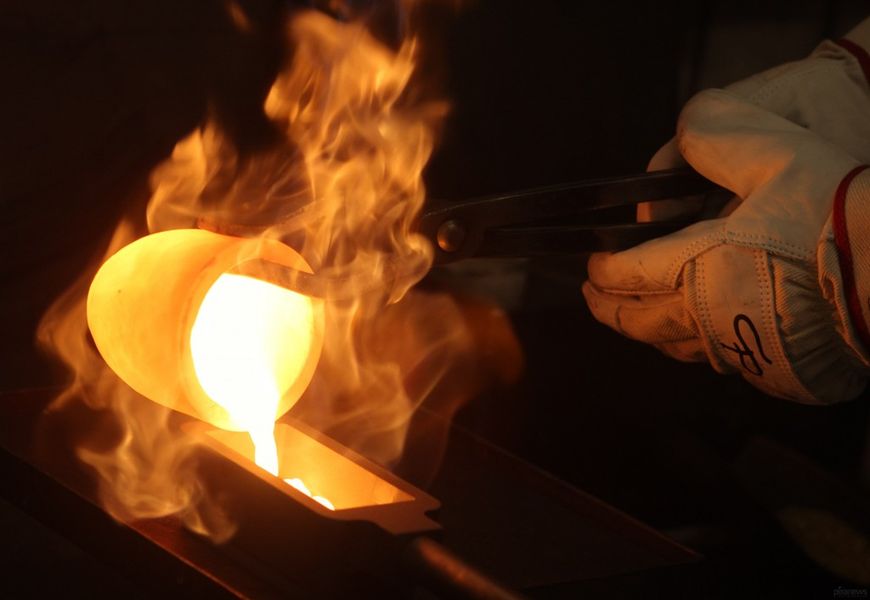
Copper, palladium, platinum are often impurities. The use of additives is necessary to give the base hardness, resistance to deformation.
The combination of metals with different properties produces a material in a variety of colors: red, greenish, white, different shades of yellow.
Noble metals: definition and properties
The noble metals were named for their unique natural properties:
- high inertness: react only with certain substances and acids;
- excellent thermal and electrical conductivity: allows their use in various spheres of life;
- high melting point and density;
- softness and malleability: they easily take the shape of the desired object.
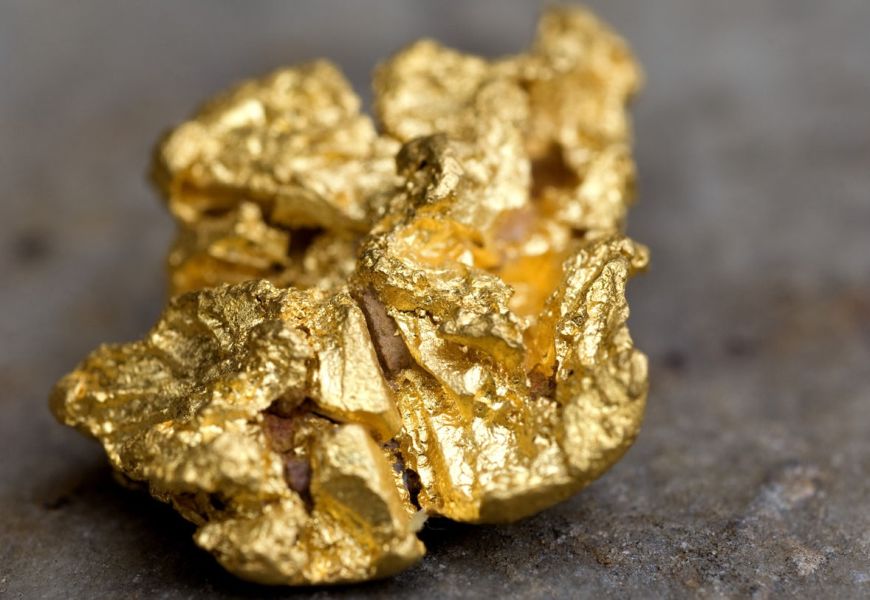
All this allows them to remain unchanged for a long time. Gold, silver, platinum, osmium, iridium, palladium, rhodium, and ruthenium are considered to be such metals. These metals are natural and exist in limited quantities.
Main components of precious alloys according to GOST
The standards governing the production of expensive alloys, the ratio of components, are prescribed in GOST 30649-99. Precious metal alloys can consist of silver, gold, platinum. Additives include cadmium, copper, palladium and zinc.
Popular components of costume jewelry alloy are nickel, chromium, and medical steel. Sometimes titanium is used to make more durable costume jewelry. But such items cost considerably more.
What is the difference between the bijouteral alloy and jewelry: pros and cons
To understand the difference, you need to know Composition. Jewelry alloy necessarily includes precious metals. In turn, the costume jewellery base consists of a mixture of non-ferrous metals. The resulting material resembles the precious metal as much as possible, repeats its color and is distinguished by its durability. All costume jewellery is gilded or coated with a rhodium layer.
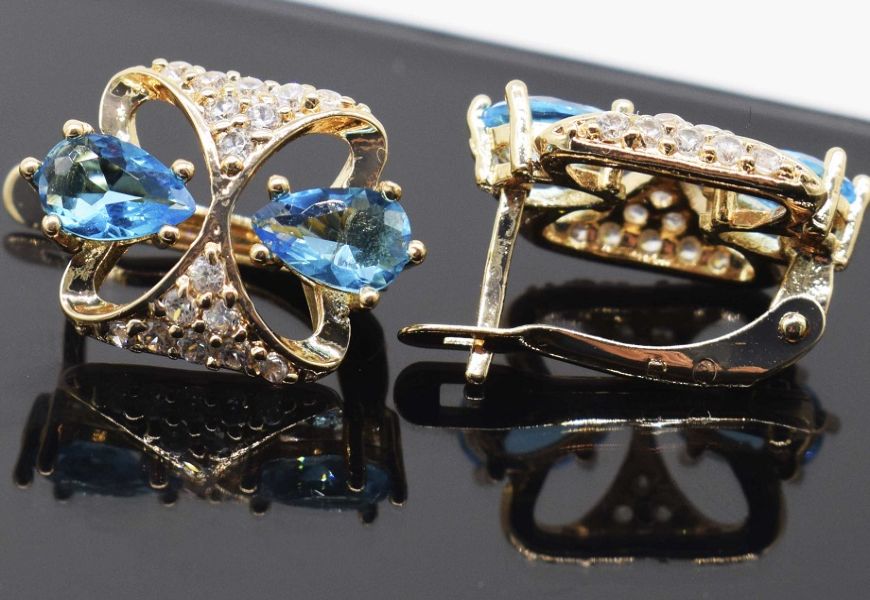
Jewelry steel for jewelry and its kinds
Jewelry (surgical, Medical) steel is an alloy of iron, carbon and other alloying components with anti-corrosive properties. It is used not only in jewelry. Steel is used to make:
- surgical instruments, some bone implants;
- expensive dishes;
- shells for some cell phones;
- cases and bracelets of expensive watches;
- jewelry and high-end bijouterie.
Melchior
A combination of several metals with increased strength, which is the cheap equivalent of silver, is called melchior. The main components are iron, manganese, copper, and nickel. The alloy is used in the production of services, sets of utensils, dishes, pitchers, cutlery. Sometimes there is bijouterie made from melchior which is passed off as silver. Such items require special treatment as they quickly oxidize and change color.
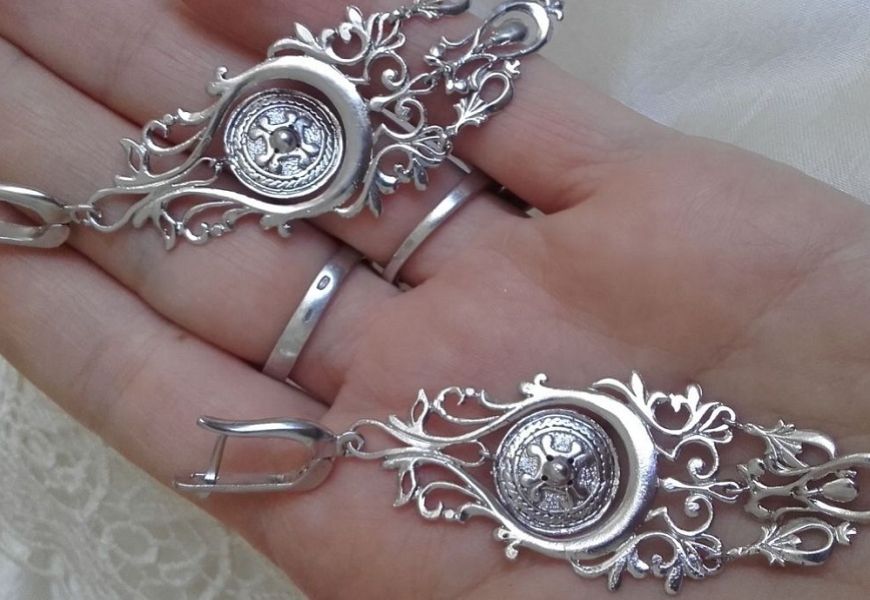
Bronze
It consists of a copper-zinc mixture. It is characterized by a reddish color of products. Small amounts of impurities may be used to enhance certain characteristics. It is referred to as zinc alloy (Zink Alloy):
- cups;
- dishes;
- parts of the window grilles;
- railing;
- gaskets;
- fittings;
- decorative door handles.
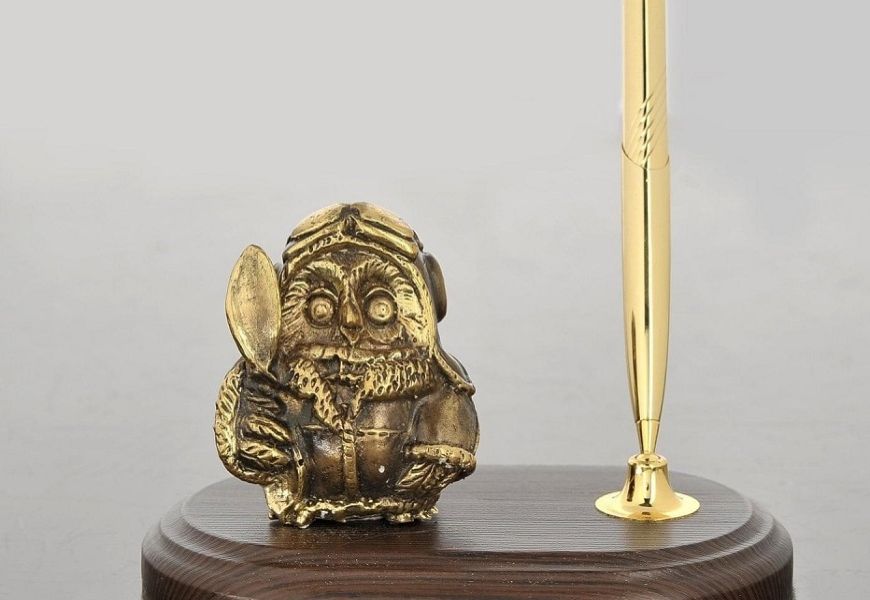
Neusilberg
It is considered a three-component, including only zinc, copper, and nickel. It has a beautiful yellow color. The advantage is considered resistance to moisture. It is used in production:
- medals;
- awards;
- medical equipment;
- dishes;
- guitar fret;
- some of the jewelry.
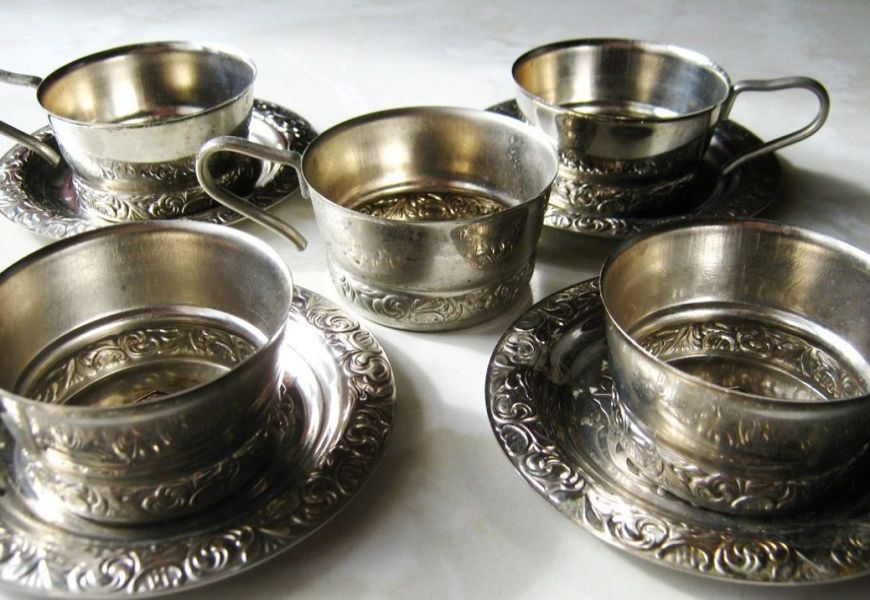
Pewter
It is made of tin. The material is soft and easy to work with. Products can be covered with gold or silver. This alloy is used to make replicas of jewelry and gilded costume jewelry. It is often referred to as metalalloy.
Brass
Characterized by copper-zinc composition with minor impurities. It has a bright yellow tone. The metal can be used for production:
- of the toothed crowns;
- decorative elements of furniture;
- taps;
- o-rings;
- of various costume jewelry.
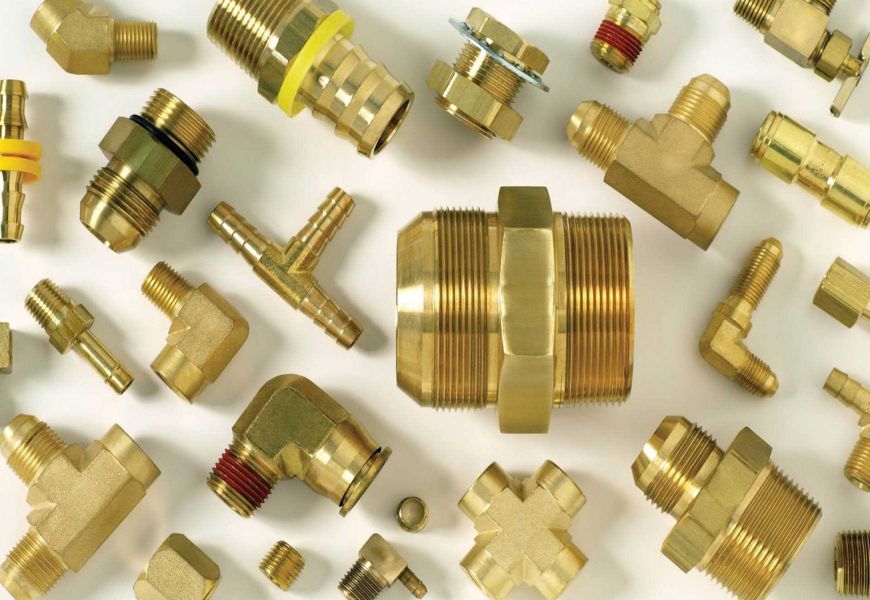
Electroplating for costume jewelry
Applying gilding to costume jewelry is the most popular method of creating jewelry. The electroplating method involves coating different materials with a thin layer of gold using an electric current.
The process involves the use of a brine bath through which a current is passed.
Due to this exposure, the gold available in the solution is evenly distributed on the surface of the product.
What alloys exist, their features
Most jewelry compositions are based on gold, silver or platinum. To improve their natural qualities, admixtures of other metals permitted by GOST are used. As a rule, the proportion of one additional component does not exceed 10%.
This is necessary to strengthen the strength, increase protection from external influences.
The material is most commonly used by jewelers in the production of jewelry. Based on the composition, there are several types of alloys that differ in properties.
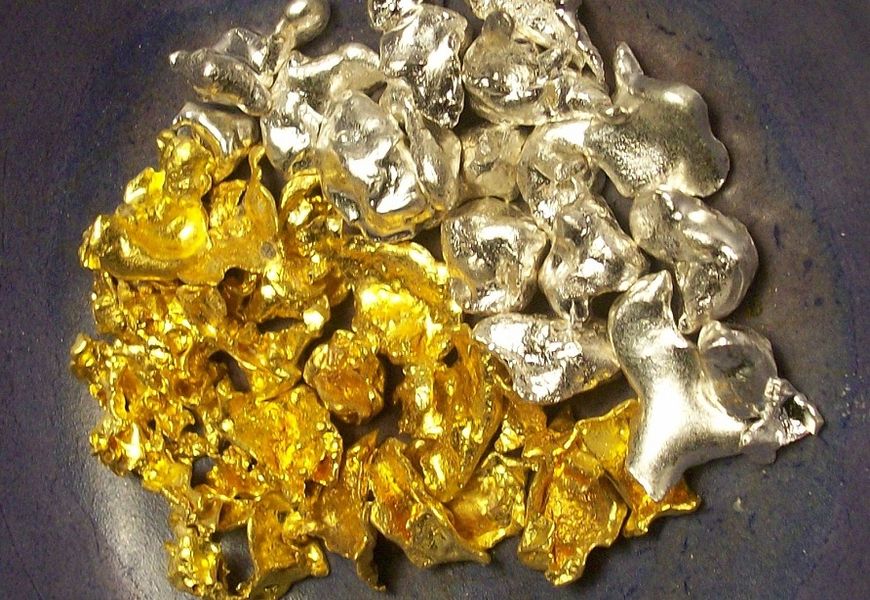
Gold Alloy
Gold is an expensive and rare metal, highly valued and its alloys. The composition may contain:
- cadmium, zinc - give products a light greenish tone;
- copper, nickel - increase strength and durability;
- platinum, silver - make the composition white.
Permissible gold marks
- 375, 500 - relate to gold-containing samples and is quite seldom used. It contains from 50% to 72% impurities.The high content of copper and silver makes the alloy less inert, due to which the products tarnish, change color.
- 585 hallmark -The most valued by jewelers, the name suggests 58.5% of pure gold in its composition. The distinctive properties of this composition are the increased strength and hardness of the items. The metal is not capable of oxidizing or tarnishing. The hue of the metal may vary according to the proportion of additional components.
- 750 -contains 75% of pure precious metal. The alloy is strong, durable, and has a distinctive bright luster. Applications include jewelry, dentistry, and electrical engineering.
- 958 proof - is distinguished by its high cost and distinctive bright yellow color. The precious metal is unable to come into contact with the environment and chemicals. It is used for the production of expensive jewelry.
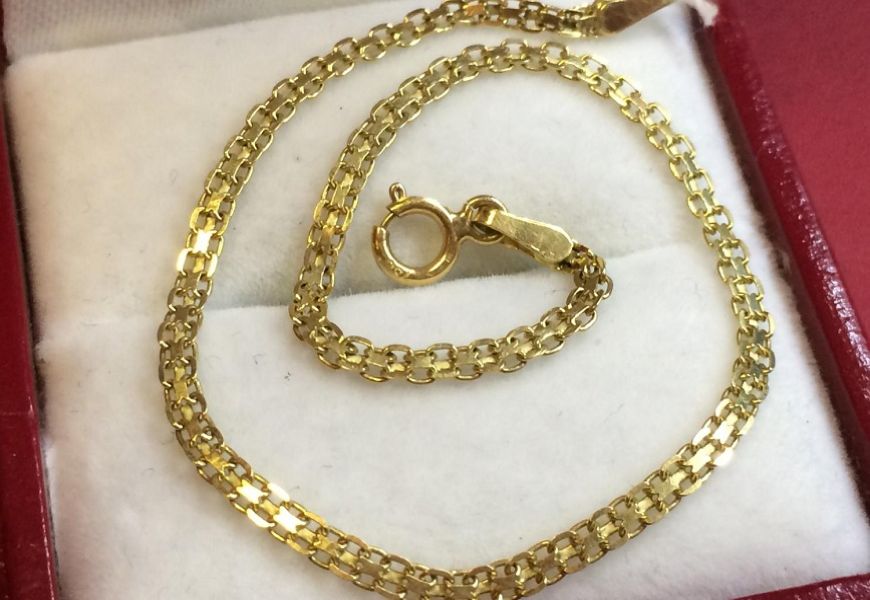
Other non-traditional color alloys
Modern fashion trends make popular gold in unusual colors. Encounters:
- Purple gold can also be called purple. It is the result of mixing gold with aluminum. It is a fragile material. Even a slight bump can cause damage.
- Blue Gold - is obtained when gold is mixed with indium or gallium. The former contains no more than 46% of gold and the resulting color is more like gray. Alloy with gallium contains almost 60% of gold, but the shade is bluer.
- Black gold - A black hue can be obtained by adding cobalt, sulfur and chromium to the gold ligature.
Silver alloy
Pure silver oxidizes quickly and darkens. This can be changed by using copper, aluminum, or nickel as an impurity.
This material does not react so much with oxygen, has an unusual luster.
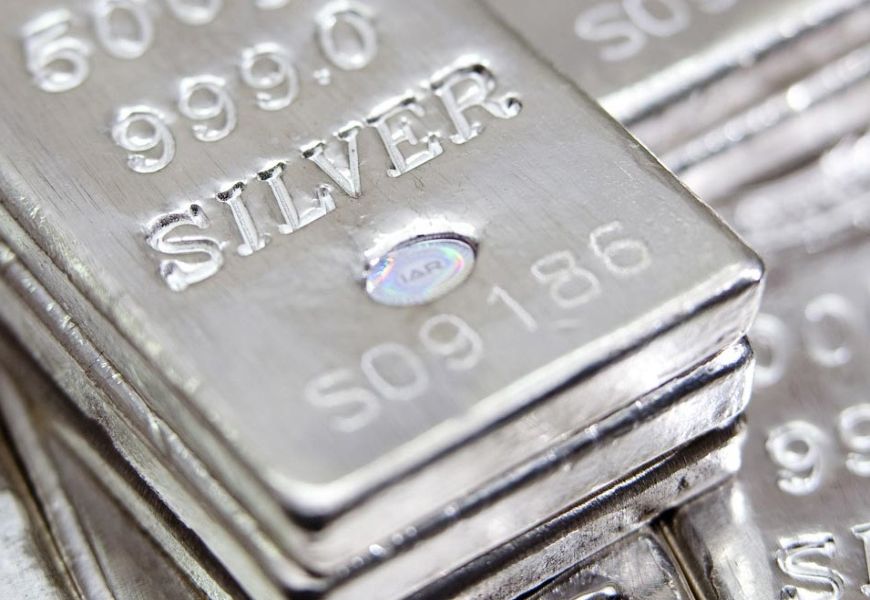
Silver markings
- 800The samples are considered almost identical and have a characteristic yellowish tone. Both grades are quickly oxidized and turn black. The alloys are used for cutlery and souvenirs.
- 875 proof is used for casting various items due to its low melting point. It can be easily hammered and minted, which makes it in demand in jewelry.
- 925 - a favorite assay of jewelers. The resulting objects have an attractive luster. The metal is malleable and easy to work with. The acquired shape is retained throughout the life of the piece.
- 960 - composed by 96% of pure precious metal, rarely used by jewelers because of the softness of the base. Suitable for unique artistic jewelry with fine filigree patterns.
Platinum alloy
Platinum alloy is distinguished by its special steel luster. Platinum itself is a strong, ductile and durable material. The metal is considered rare and combines well with silver and gold. Additional components may be:
- cobalt - aimed at improving the casting characteristics of the material;
- Copper - added to increase the hardness of the metal;
- Rhodium - helps preserve the natural luster and enhances the wear resistance of products.
Acceptable platinum samples
- 850 - includes 85% of pure platinum. This metal is rarely used by jewelers because it quickly loses its natural luster.
- 900 - despite its cloudy tone and insignificant luster is used to make jewelry with stones.
- 950 is the most valued by jewelers. It is considered the purest, which explains the high price of platinum jewelry.
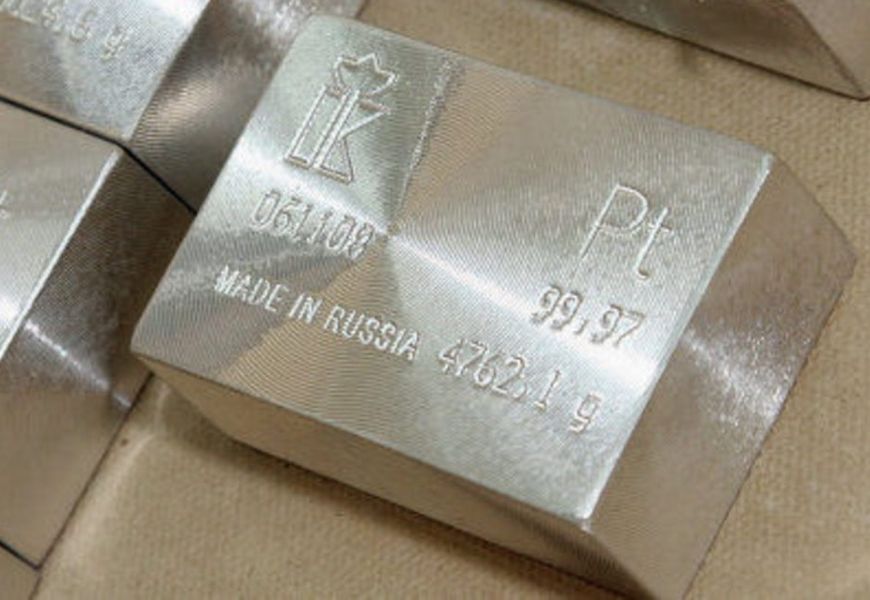
What do you cover the jewelry with?
Regardless of the composition, all items are coated with an additional protective layer. To preserve the luster and appearance of your jewelry for longer, they use a coating:
- eloxal - can be used in the production of jewelry, but most often it is a protective layer. The coating is applied with aluminum oxide, which allows in the process to change product color.
- Rhodium - is characterized by durability, hardness of the coating. It is unaffected by water, grease and acids and retains its natural luster. Rhodium plating is used to protect your jewelry.
- varnish is a popular budget product for jewelry or silver. The protective layer prevents external substances from coming into contact with the metal, enhances shine, but does not last long. Over time, you will need to restore the protective coating.
Proper care of jewelry made of appropriate jewelry alloys
Jewelry alloys do not need special care, but requires compliance with certain rules:
- periodically wipe the jewelry with a flannel cloth;
- take off the product before going to the gym;
- It is better not to soak jewelry in chlorinated and salt water;
- Do not use aggressive and chemical agents for cleaning.
Video: precious metals and alloys, types of jewelry
Reviews
It turns out that even certified jewelry stores now sell costume jewelry. The price of a few thousand rubles often makes one think it is low-carat silver. Outwardly, they are virtually indistinguishable. Only after buying and careful examination, you can find defects that tell you that this is high-quality costume jewelry. But a nice bonus becomes a guarantee from the stores, which was not the case before.


There are many inexpensive alloys that can be used to make home jewelry. All of them, when properly processed, resemble expensive jewelry, but cost much less. Experimenting with the composition of the alloy can change the color of the jewelry and even the style. Using mixtures of base metals is a great alternative for those who do jewelry for the soul.
The Pandora jewelry brand is one of my favorites. That said, the Pandora Rose jewelry collection with its unusual pink tone caught my eye in particular. I was sure that the jewelry was gold. It turns out that the feature of this line is that it is silver, and such color is obtained by adding copper and gold plating. In spite of that the whole series pleases with unusual figures, sophistication and warm luster.

Jeweler's comment

